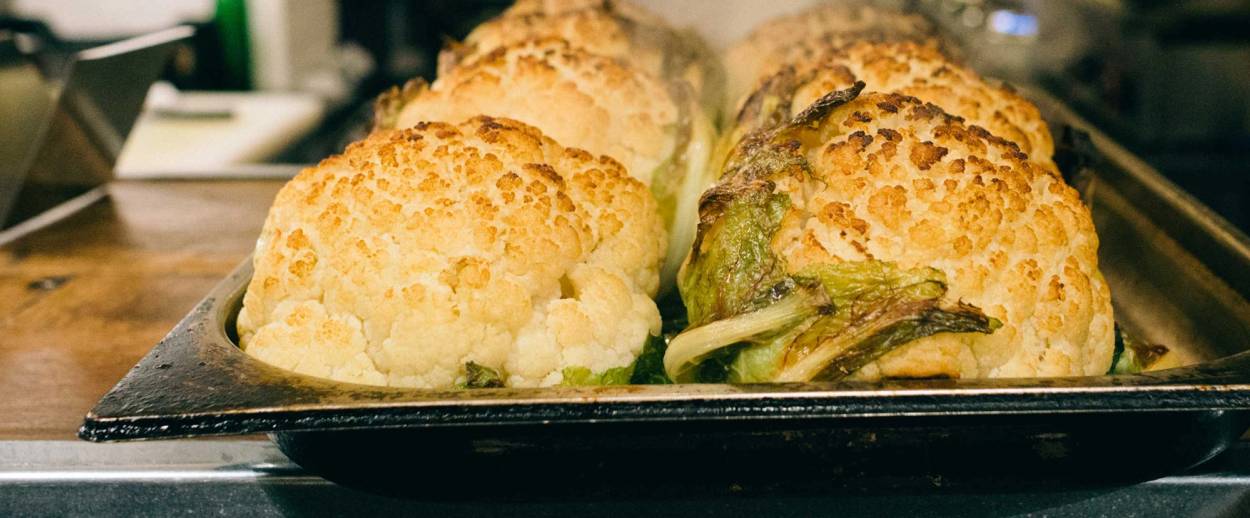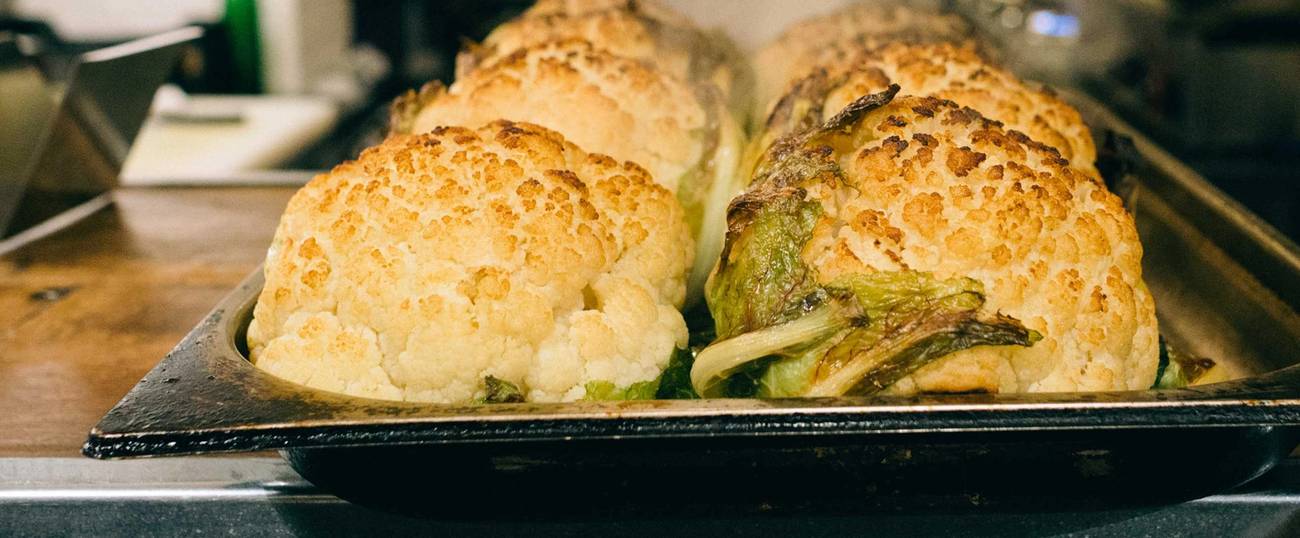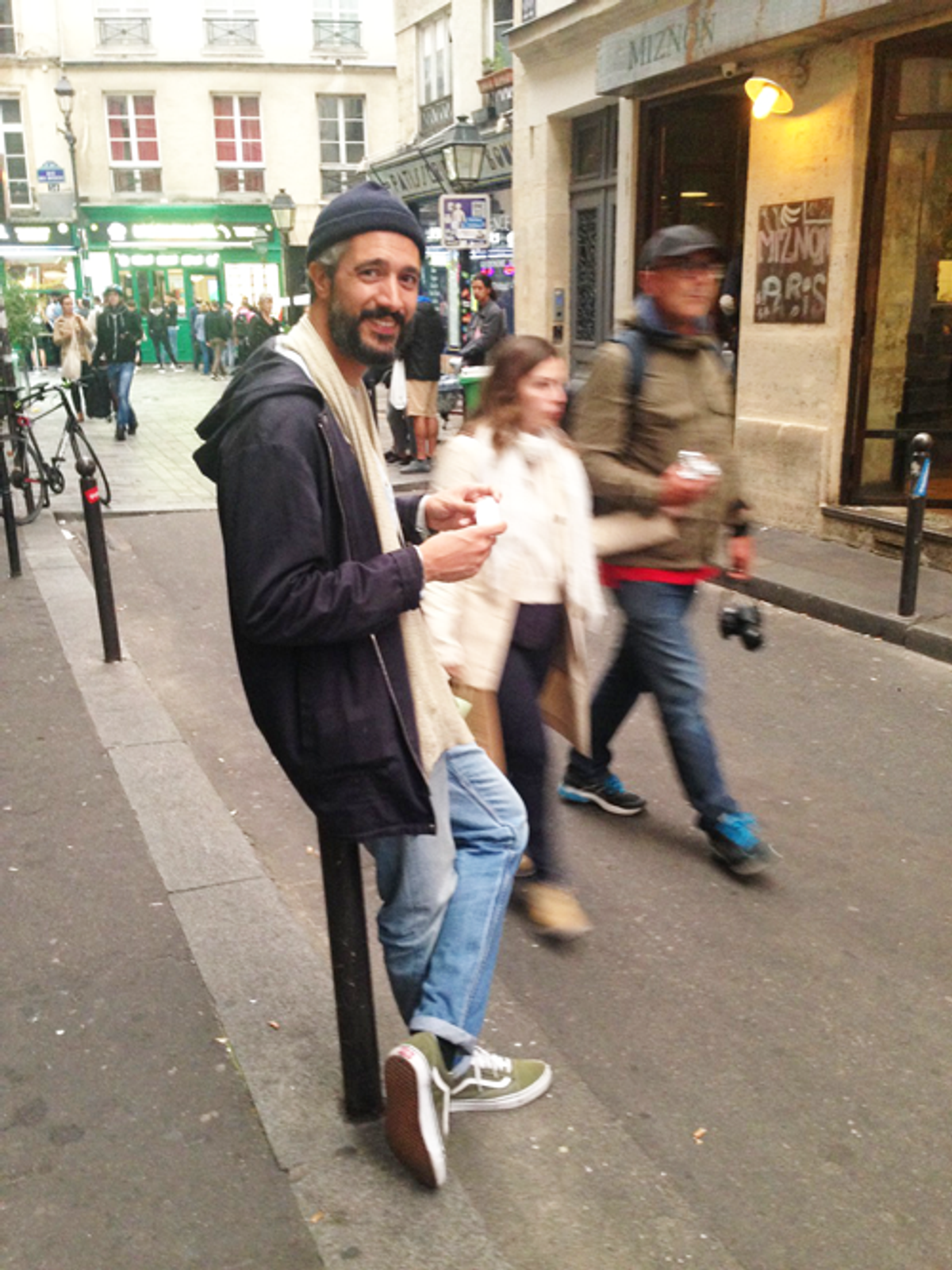In Paris, Kosher Restaurants Go Rogue
Chefs and owners are going without official certification to cut costs and broaden their clientele. Will kashrut-observant diners still come?




Pillowy pita stuffed with beef bourguignon and garlic aïoli, or a dessert version of hand-torched “banana brûlée” with melted dark chocolate and shredded coconut, is hardly standard Middle Eastern fare. But if any restaurant can succeed cramming delicacies into pocket bread, Miznon can.
Israeli culinary celeb Eyal Shani launched this no-frills chain in Tel Aviv in 2011. It now dishes up sandwiches at a dozen locations worldwide (many of them licensed) in Vienna, Melbourne, and New York. But in Le Marais, the fusion neighborhood where French meets Jewish, Ashkenazi meets Sephardi, and straight meets gay, Miznon Paris is filling a new niche.
Unlike its Tel Aviv namesake, this Miznon is kind of kosher… more like off-the-grid kosher. Observant co-owner David Moyal proffers strictly kosher meat and wine, serves no dairy or shellfish, and closes on Shabbat. Sans supervision from the usual suspects—the Paris beit din, Chabad, Chief Orthodox Rabbi of Paris Mordechai Rottenberg—or any other third party, Miznon posts no kashrut certificate, or teudah. Nor does the restaurant employ a mashgiach, the on-site personnel de rigueur at kosher meateries. But the word is out. On any given day, bearded men, skirted women, and other spiritual epicureans are tucking into this nouvelle cuisine: kosher gone rogue.
“This is the only restaurant I allow myself to eat where there is no beit din because I know the owner,” said a 30-year-old woman dining with friends. “He won’t say it’s kosher if it’s not.”

Miznon Paris is not alone. In fact, the city’s glut of kosher restaurants may, at least in part, encourage trendsetters here to reject the rabbinate. A throwback to simpler times, these entrepreneurs are embracing a well-established social contract. A parallel to home hospitality, the arrangement leverages personal credibility to satisfy concerns among observant customers. It cuts the costs of contracting hashgacha, kosher certification. And it creates distance from an establishment many question. Innovative restaurateurs also eliminate what they perceive as a “ghetto stigma” that deters the desirable general public, more interested in unconventional menus than mitzvot.
“I wanted this place to be open to everyone in Paris,” said Moyal, who launched five years ago in Le Marais, where he resides. “The problem, in Paris, if you ‘put’ the beit din [on the door], you will have only Jewish people. And then it will be closed to other clients. If you are not Jewish, you want to be in a place that’s only Jews?”
His argument appeals to diners open to this new-old kashrut paradigm. “It is a trust-based relationship between me, the owners, and the chefs,” said student Daniel Voignac, 22, a Miznon patron who observes kashrut and Shabbat. “They told us the mentality and why they don’t go to the beit din and I agree with that. The reputation outside the Jewish community is diminished.”
Beit din supervision costs are high, according to shochet Henri Tordjman, who operates nearby butcher shop Boucherie Norbert a l’Oranaise. The price is levied by weight: €7 a kilo, roughly $4 a pound.
Another concern is a lack of faith in the Consistoire, which governs the French Jewish community. In contrast to the United States, “Judaism in France is centralized,” said marketing consultant and native Parisian Ruben Uzan. “There’s rebellion in the galaxy because it’s overpriced. The trend is to go rogue. These restaurants have a customer base that is larger than the Jewish community. It terms of business, it is the wrong choice to go with the beit din because you are getting ripped off.”
Business has been so consistent at Miznon that in June, Moyal and local partner David Mimouni opened a second Paris location at 37 Quai de Valmy, along the 10th arrondissement’s magnetic Canal Saint-Martin. At both Paris locations, Miznon is lax on certain Halakhic stringencies, such as bishul akum—cooking by non-Jews—or following procedures for examining produce. (For example, rabbinic authorities suggest soaking cauliflower, a popular side at Miznon, in salt water to purge insects prior to cooking.) French-born Gerald Grenassia, who visits regularly from Bat Yam, Israel, where he only eats at supervised restaurants, simply steers clear of vegetables subject to more intensive kashrut preparation. He, too, uttered the refrain: “I’m only here because I know the owner.”
*
Chef Yariv Berreby anticipates such dietary concerns at his Paris restaurant, Salatim, marking his menu with icons for gluten-free, lactose-free, and “kosher friendly.” “I decided to make a new hashgacha,” Berreby explained. “It’s ‘social kosher.’ The message is trust and telling friends the restaurant is kosher. ‘You trust the chef, so you can come eat.’”
A native Israeli who observes Shabbat, Berreby moved to Paris after serving in the IDF tank division. He studied at the Ferrandi Culinary School and opened Salatim a year ago in the 2nd arrondissement at 15 La rue des Jeûners. For Berreby, whose pride is his mother’s schnitzel, priorities are culinary: “The idea of Miznon, and what we do, is a trendy Israeli kitchen. Kosher is a bonus.”
Besides, he says, certification is a contemporary construct. “There is nothing written in the Torah that you must have hashgacha at a restaurant,” said Berreby, who estimates 40 percent of his clientele keep kosher. “To believe in someone who gives you his word is more important, because now we see sometimes, the supervisors lie.”
Among Jewish lay leaders, such doubts loom large. “From kashrut supervision for weddings to divorce proceedings, every service is overpriced,” said management consultant Michael Ansellem, a Salatim regular. “Because the quality of service is not great, it contributes to a bad reputation and the public perception of a corrupt organization.”
That attitude concerns one of the world’s leading kashrut experts. “The rabbis I have met in Paris are very reputable,” said Rabbi Moshe Elefant, chief operating officer of the Orthodox Union’s Kashrut Division, which is based in Manhattan and operates globally. “The way you correct something is by doing it right, not by deciding it doesn’t need to be done.”
Salatim’s Berreby takes another approach. In his “next-level kashrut,” transparency is key. “If someone wants to see that the meat is kosher, I show him the hashgacha of the meat,” Berreby said. “And if someone wants to see that I don’t have dairy products, I bring him into the kitchen, open the fridge, and show him.”
Another added benefit? Community. “This trust creates a bond between me and the customer and I get to know them like they get to know me,” Berreby said. “It’s like I open my home. It’s more like family.”
Still, these dynamics don’t satisfy the O.U.’s Elefant.“Every kosher home is kosher because the person running the home is kosher. The letter of the law doesn’t tell you a home needs a hekhsher,” he said. “However, and this is a big however, there is a very big difference between someone’s home and a restaurant. No matter how much you’re serving, how large a family, or how many guests you have, a home is not operating on a commercial basis. It’s much easier to control. … The person who cares about kashrut should not be eating in such a restaurant because if you care about kosher and you want to be sure it’s kosher, you need a reliable hekhsher.”
Throughout Le Marais, despite its recognition as a Jewish tourist destination, some restaurants have eschewed official supervision. While L’As du Fallafel is beit din-certified, for instance, nearby Israeli-style grills—namely Mi Va Mi, King Falafel, and Chez Hanna—say they serve kosher meat, but also operate on Shabbat; they have no hekhsher.
“It’s not a situation I can endorse,” Elefant concluded. “If a restaurant in a community is going to serve food and sell it as kosher, they need supervision.”
Or Bitan, chef at Miznon’s Saint-Martin, is not fazed by such requirements. “Every chef in Paris knows,” she said, “if you’re making good food and using quality products, there is a place for everyone.”
***
Like this article? Sign up for our Daily Digest to get Tablet Magazine’s new content in your inbox each morning.
Award-winning journalist Lisa Klug is the author of the bestselling pop culture titles Cool Jew, a National Jewish Book Award Finalist, and Hot Mamalah: The Ultimate Guide for Every Woman of the Tribe. Her work has appeared in many outlets, including The Atlantic, Forbes, Forward, Huffington Post and The Los Angeles Times, as well as The New York Times, The Times of Israel, and Variety, where she is a stringer. Visit her Facebook page, or follow her on Twitter @lisaklug.